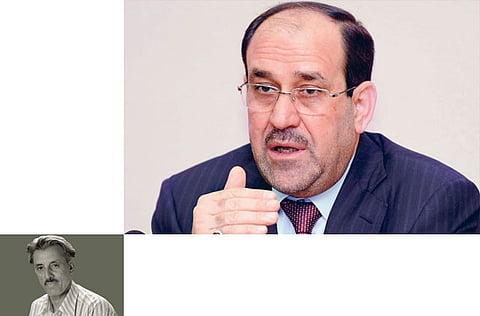Iraq’s crisis of confidence
The recent unity among Syrian Kurds shows the rise of nationalist sentiment

The domains of political conflicts between Iraqi politicians vary between states and regions. They are reflected in the advances each has made towards democracy. Differences depend on interests of their respective communities and policies are developed to best fit the public. However, often, personal conflict and competition shape the political scene — not living up to people’s expectations of security, stability and service. This form of conflict is identifiable in a dispute between the central government and the Kurdistan region, more specifically between Nouri Al Maliki and Masoud Barzani.
It could be argued that the crisis between Barzani and the State of Law coalition — headed by Al Maliki — centres around the fact that politicians from the Kurdistan Alliance have voiced their concerns about the tension created by Barzani. They have advocated the need for direct dialogue by forming a committee of the Kurdistan Regional parliament to discuss issues with Baghdad.
This indicates that despite being under Barzani’s control — he denies he is the cause of the tension — the Kurdish opposition wants to preserve relations with Baghdad.
Allies such as the Liberal bloc of the Sadrist movement, the Kurdistan Alliance and the Iraqi List had also backed Barzani earlier in the year with a no-confidence vote against Al Maliki. Kurdish leaders aim to expand their autonomous region across a swathe of territory that stretches from Iraq’s eastern border with Iran to its western frontier with Syria, an idea which has faced strong opposition from Al Maliki’s government.
When assessing the policies of both Barzani and Al Maliki since the formation of the Iraqi government, it is important to consider their contribution to political changes in international, regional and domestic contexts. A year ago, Barzani had the upper hand. Ankara had a good relationship with the central government because of the increase in the volume of trade. Barzani strengthened his relations with Turkey after he was recognised for his influence on the Iraqi government and his views about the need for the PKK to give up its arms and renounce violence. The PKK — the Iraq-based Kurdistan Workers’ Party, labelled a terrorist organisation — began concentrated attacks in the mountains along Turkey’s border with Iran and Iraq, to which Baghdad turned a blind eye. Al Maliki’s hostility towards Turkey, amongst other factors that have contributed to tense relations, led the leadership in the Kurdistan region to realise the need to alter the balance of power and develop a relationship with Barzani.
Barzani is extremely sensitive about the issue and has worked hard to prevent PKK elements from northern Iraq from crossing over into Turkey. He has also tried to disrupt the PKK’s logistics and even encourage them to disarm. Furthermore, Barzani has also had a significant role in recent events in Syria, helping Syrian Kurds in their goal to establish their own state. While the conflict between the Syrian regime and the opposition continues, Barzani succeeded in reconciling the different Kurdish groups in Syria. These events highlight the ambitions of Barzani and also point towards the leading role plays in decision-making in Baghdad.
The Syrian regime’s survival even after losing control over most parts of the country cannot really be attributed to Al Maliki’s efforts, which denied Iraq’s involvement in the UN resolution, in order to preserve its role as a mediator. There has been criticism of the Iraqi government for supporting a sinking regime.
The competition between Al Maliki and Barzani has been heightened as Al Maliki tries to establish special relationships with Turkey, Qatar, Saudi Arabia and the US. Perhaps by forging these relationships, Al Maliki is trying to compensate for his lack of influence in Syria.
Despite the obstacles, it can be seen that leadership in Kurdistan has played a significant role in terms of contributing to political changes on an international and regional level. Not only have relationships with Ankara improved, but also alliances with Arab countries such as Qatar and Saudi Arabia, which have the ability to make real changes in the region after the weakening of Egypt.
The conflict between the two leaders highlight a crisis of confidence and the fact that the Iraqi authorities are possibly not capable of resolving political issues on the national level, let alone aid neighbouring countries.
In addition, Kurdistan, for more than half a century, has seen nothing but strife. The recent unity among Syrian Kurds shows the rise of nationalist sentiment. Those that reject this “experiment” of internal actors guiding the regional political situation will have to accept the new realities of Iraq.
The chronic problems in Iraq can be attributed to the complications that exist on a national level which affect participation and involvement on the international stage. The need to promote the intellectual and cultural elements of Iraqi society, without building walls of separation internally, is essential for fostering relations within the Kurdish region. The row poses the biggest threat to the region’s long-term stability. Hence, ending the conflict between Al Maliki and Barzani is essential.
Dr Shakir Noori, a writer and journalist, is based in Dubai.


